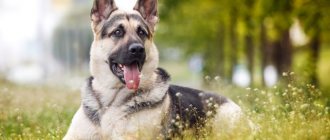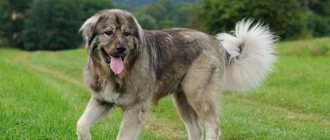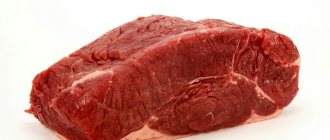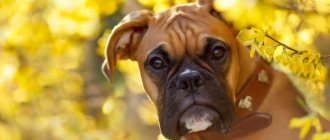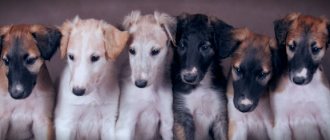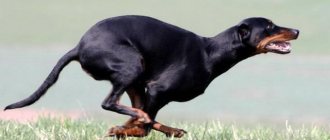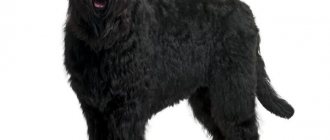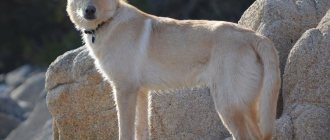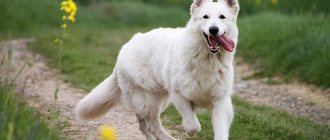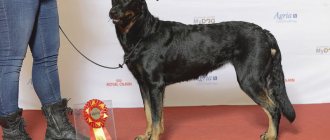Among all the four-legged fluffies, one curious breed stands out, which surprises with its specificity and originality - the Afghan hound (photo below). All the qualities that the pets of the breed have are the work of a person who crosses different individuals of this species. The result was not long in coming: such animals combine beauty, grace and intelligence.
Let's look at the main characteristics of the breed: history of origin, appearance, characteristics of character and behavior, basics of keeping and caring for such a pet. Let's look at how, where and for how much you can buy Afghan hound puppies.
Breed characteristics
| Short description | |
| Origin: | Afghanistan |
| Conditions of detention: | House or cottage with spacious surrounding area |
| Purpose: | Hunting |
| Color: | Dark, bright red, red, white, ash and sand |
| Wool length: | Lengthened on the muzzle and along the body. Short on the back |
| Adult dog size: | The height of females is 22-32 cm, males 68-75 cm, weight of males is approximately 25-35 kg, females - 61-70 kg. |
| Average life expectancy: | From 11 to 13 years |
| Walk: | At least 2 times a day |
| Physical activity needs: | From 8 months onwards, average physical activity needs (walking from 1 to 3 hours a day). Intense running and jumping possible |
| Fédération Cynologique Internationale (FIC) classification: | Group No. 10 greyhounds, section No. 1 long-haired greyhounds |
| Puppy price: | From 15 to 50 thousand rubles. |
Where can I buy
The main thing: puppies are very different from adult dogs of this breed. Therefore, you need to buy them in special receivers, with the presence of the pedigree of a particular individual. You should also observe the behavior: clumsiness and activity are present - you can safely take it.
The average price throughout Russia ranges from 30 to 75 thousand rubles. And if the puppies come from champions, then the cost increases to 100 thousand.
History of the origin of the species
The first mentions of the breed were found in Iranian drawings in the 11th century. BC. Much later in the 2nd century BC. corresponding inscriptions were applied to the walls of the dugout in Afghanistan. Today the dog is considered a symbol of this state. Most recently, the government lifted the ban on the export of greyhounds for sale outside its borders. This breed was brought to Europe by officers from England. They spotted her on the border with Afghanistan while returning from India.
The first official club appeared only in 1926 in England. Experts were able to evaluate the adaptive qualities, so the breed standard was confirmed.
Interesting Facts
There are several interesting facts associated with white Swiss shepherds:
- Representatives of the breed are called “talkative”, as these shepherd dogs have a wide range of vocal signals. The owner gradually gets used to them, but such sounds seem strange to strangers.
- It is believed that the breed originated from the American male Lobo, who was born on 03/05/1966. His descendants and other light-colored dogs that were brought from America and Canada continued the Swiss lineage in Europe.
- The white shepherd served as the prototype for the main character of the cartoon "Volt".
- Several light-colored shepherd dogs were pets of the Rockefellers. In addition, the writer Neil Gaiman and the artist Eva Soul liked this breed.
Distinctive features
The Afghan Hound is the pride of an entire nation. Previously, they took her with them on hunts, but today they make her a participant in tournaments. They are tested for compliance with the following standards:
- The skull is narrow, elongated. There is a pronounced tubercle on the back of the head. The transition line from the forehead does not have sharp boundaries.
- The head is proportional, not narrow. Characterized by the presence of bangs.
- The nose is completely black. May be brown in dogs with light coats.
- The eyes are slanted and well defined. Triangular shape.
- The ears are large and hang down to the neck. They are completely covered with fur.
- Jaw – the teeth are arranged in a scissor-like manner and form a strong grip and correct bite.
- The teeth are white and straight. Plaque is not allowed.
- The neck is long and has a muscular base.
- The limbs are strong, smooth with well-developed muscles. The elbows are set close to the body. The shoulder blades are located at a slight angle to the body.
- The body is well-developed muscles. Sloping croup. The ribs have a convex structure.
- The withers are located high.
- The paws are in a free position, the fur is thick, the pads are black and soft.
- The tail is low and slightly dewy. The end is made in the shape of a ring and does not get on your back when moving.
- The coat has a dense structure with elongation on the muzzle. Short hairs are found only on the back.
- The color is dark, bright red, red, white, ash and sand.
Description of the Afghan Guard Shepherd
The purpose of the Afghan Shepherd is watchdog and security functions, as well as herding duties.
Breed standard
Depending on their original habitats, several varieties of sage koche are distinguished:
- Mountain. Large, often gigantic animals with massive bones and voluminous muscles. The coat is very thick and long, protecting from any weather and temperature changes.
- Steppe. Dogs of a lighter build, similar to greyhounds, are agile and fast. The coat is long or medium length.
- Deserted. Light-bodied and medium-sized, nimble dogs with short coats (sometimes of medium length). Warm undercoat is formed only in the cold season.
The Afghan Shepherd is a large and powerful dog.
There is no breed standard as such; only breed characteristics that combine all three types can be distinguished:
- A large, slightly flattened head with an elongated muzzle, widening towards the nose, set on a long, strong neck (there is a dewlap).
- At birth, the ears are drooping, small, and triangular. They are docked to the very base.
- The nose is large and always black.
- The eyes are oval, deep-set, small in size. The iris is dark brown.
- Strong, powerful jaws in a scissor bite.
- The tail is long, saber-shaped. It is docked up to a third of the length.
- The limbs are powerful, heavily muscled, strong and long, the hind legs are set slightly wider than the front ones. Oval paws with thick toes gathered into a dense ball.
- Body weight: for bitches - 40–60 kg;
- for males - 70–95 kg.
- in females - 69–80 cm;
The color can be absolutely any, but the most common are spotted, black, white and brindle. A distinctive feature is the presence of dark spots on the skin and in the mouth that are not visible through the fur.
In some dogs, the canines are hook-shaped with a thickened base and a sharp end directed into the mouth.
Photo of an adult dog
Photos of puppies
Features of character and behavior
Opinions about the Afghan hound are controversial . The owners note the unusual character. Some also claim that she can be uncontrollable and revengeful. However, any difficult character can be dealt with with the right approach.
Experts recommend early socialization. It is produced throughout the entire period of growing up. Thanks to this, it is possible to obtain proud and fearless dogs. They can come into conflict with an animal that is significantly larger than them in terms of volume and speed of movement.
The breed is fast, with excellent memory. Without attention, the dog becomes capricious. It is not recommended to be intrusive and touch their fur. Prohibitions should be introduced from childhood. In adolescence, dogs can be hot-tempered because they want to dominate.
Advantages
For each owner, their own dog is considered unique. However, there are common advantages that characterize the entire breed:
- Affectionate.
- Tender.
- Trainable.
- Energetic.
- Hardy, with a complete absence of fear.
- They have personal dignity.
A dog can demonstrate these qualities with proper upbringing and regular communication with its owner.
Flaws
Unfortunately, there are a number of disadvantages that characterize the Afghan watchdog:
- Capricious.
- Proud.
- Tend to show aggression.
- They may suddenly become afraid.
- A person may have problems during his upbringing.
- Constant coat care is required.
- Should not be started in families with children under 7 years of age.
Brief historical background
The ancient origin of the Afghan Shepherd is evidenced by its name, which can be translated as “dog of the nomads” from the word kochee, meaning “nomad”. The exact time of the origin of the breed is unknown, but it is believed that it occurred long before the appearance of many of the currently known purebred dogs. Its relationship with the famous and popular Central Asian Shepherd Dog is practically beyond doubt (according to some sources, it is the ancestor of the Alabai).
In ancient times, the dog that accompanied nomads on their seasonal treks through the mountains must have had exceptional adaptive qualities in order to quickly adapt to extremely difficult environmental conditions. Dogs not only fulfilled their direct duties of guarding and protecting herds, but also participated in dog fights (and still participate, although this is prohibited). In addition, the animals had to get their own food.
Afghan Shepherd involved in illegal dog fighting
Today, Afghan Shepherds are most common in northern and central Afghanistan and the surrounding countries of Central Asia. In Europe and America the breed is practically unknown. There is only one specialized breeder in Germany.
Care and maintenance
The Afghan Guard is a show breed . The owner must carefully care for the coat. The breed standard does not require shavings on the animal. That is why, when a hairstyle is created, the dog will no longer be able to take part in exhibitions.
- It is necessary to regularly inspect the appearance. Particular attention should be paid to the eyes. They collect contaminants, which are removed with plain water or weakly brewed tea.
- Nails are trimmed once every 30 days. The procedure is performed using a special tool. Otherwise, the animal may develop cracks.
- The dog's teeth are brushed twice a week. Special brushes and pastes are also used for this.
- You should clean your ears thoroughly every week. Special bones can help in this matter.
- It is also necessary to regularly rub your eyes with chamomile or black tea.
- The dog must have its own bed.
- Walks are carried out only with a leash. The animal needs communication with other representatives of the breed.
- For the necessary physical activity, you can give him to the section.
- It is best to avoid walking in hot weather. Otherwise, the risk of heat stroke increases.
Nutrition
The health and longevity of any animal will depend on properly selected food. The frequency of feeding is selected according to age needs:
- Up to 4 months – 5 times a day.
- From six months to a year – 4 times a day.
- Over one year old – 3 times a day.
- Over two years - 2 times a day.
The dog's diet should include:
- Lean chicken, beef, ocean fish.
- Offal.
- Low-fat fermented milk products.
- Boiled eggs.
- Porridge: oatmeal, rice, buckwheat, millet.
- Green vegetables, beets, cabbage.
- It is allowed to give a small amount of fresh herbs.
- Any premium dog food will also work.
Sausages, fatty meats, sweet pastries and legumes should be completely avoided in feeding.
The drinking regime directly depends on the method of nutrition and the time of year. For example, natural food contains a sufficient amount of liquid. That is why the dog practically does not drink it separately. It is important to always have fresh water in your dog's bowl. If you plan to take long walks, you should take at least 0.5 liters with you. On a hot day, the volume increases in direct proportion to the weather outside.
Health
With proper care, the dog will live up to 14 years. The breed is not classified as an ornamental breed, so it rarely exhibits genetic deviations from the normal range. With proper nutrition and the use of additional vitamin complexes, the dog will have good health.
However, it is very sensitive to even minor skin damage. The animal suffers from pain and cannot tolerate anesthesia. That is why owners should be more attentive to his health.
Vaccinations
The dog must be vaccinated against distemper, rabies, parvovirus enteritis and viral hepatitis.
Vaccination of puppies and adult dogs is carried out according to this scheme:
- The first procedure should be performed within 2 months. Treat for helminths within 10 days.
- The second one is in two weeks. You can start walking outside for the first time and interacting with other animals after 14 days.
- The third - in six months.
- The fourth - per year.
It is advisable to carry out repeated vaccinations to maintain immunity every year until the end of the animal’s life.
Diseases
The Afghan watchdog has a strong immune system. However, even for such a breed there is a threat from the following diseases:
- Constipation due to disruption of the gastrointestinal tract.
- Cardiomyopathy is diagnosed when there is a change in the walls of the heart muscle.
- When the pleural cavity is filled with fluid, chylothorax is determined.
- Ungroomed fur is dangerous. It provokes the development of dermatitis, eczema and other skin diseases.
- Myelopathy is a disorder of the spinal cord.
- Various pathologies in the functioning of the eyes.
Walk
The breed requires walks at least twice a day. With the proper level of activity, it is possible to prevent the development of dangerous diseases and age-related diseases. The animal can gallop or jog for a long time.
It is advisable to start training no earlier than 8 months. Otherwise, the animal may develop shoulder girdle diseases. It is advisable to walk only with a leash.
Grooming
A brush with soft bristles is used to comb the fur . In order not to cause pain to the dog, combing the hair begins from the ends. Gradually you should move to the roots. Full bathing is performed once every 10 days. For this, only special shampoos and balms are used. The hairs are carefully combed to prevent the formation of tangles.
The dog should visit the groomer regularly. Thanks to the right haircut, you will be able to maintain the correct shape of your hair for a long time. It is recommended to carry out such care at least once a month.
What to feed
If you get a German Shepherd, you must clearly understand the rules of its nutrition. After all, this is the basis of keeping an animal. Undereating is as bad as overeating. Therefore, strictly control the amount of food you consume, especially before physical training. The fact is that the anatomical structure of the digestive tract of dogs promotes bending and movement of the stomach during movements. In cases of overeating, this threatens intestinal volvulus.
Important! Experts advise feeding the “Germans” after a street walk
Puppy
When choosing a pet, give preference to those that have already been weaned from their mother. This will make it easier for you to introduce new foods into your diet. If you have a very small shepherd in your arms, then take into account the rules for feeding it:
- For the first 2 weeks after birth, puppies should drink only breast milk. If for some reason the mother is not present, the natural process will have to be carried out using a pacifier and bottle. The liquid must be heated to 28°C. Plan to feed at the same time and at regular intervals. The puppy should consume 2/3 cup of milk per day.
- From two weeks of age, the daily portion of food is gradually increased to 2 glasses, while reducing the number of feedings (ideally there should be 6).
- When the dog is 1 month old, it can be offered its first complementary foods in small portions. These are porridges, meat, cottage cheese, soups, vegetable purees.
- In the period from 2 to 4 months, the puppy is fed 5 times a day with a daily food intake of 3–3.5 glasses.
- From 4 months, the number of meals is reduced to 4, and the total daily portion is increased to 1 liter.
- When the dog is six months old, it is fed three times a day, feeding about one and a half liters of food.
- One-year-old animals are transferred to two meals a day.
Important! Do not give puppies boiled potatoes. In this form, the root crop is poorly digestible. It's best served raw.
Moreover, starch has a very beneficial effect on fur.
It is best served raw. Moreover, starch has a very beneficial effect on fur.
For puppies, breeders recommend the following products:
- meat (it is better to give it raw, but you cannot switch the animal to this product only);
- offal (can be given from 4–6 months);
- raw beef bones (useful from one and a half months of age, but not recommended after changing baby teeth);
- raw or boiled sea fish without bones (given from 4 months instead of meat, but not often);
- raw egg yolk mixed with porridge or kefir and boiled white;
- cottage cheese, Adyghe cheese, feta cheese, hard cheese;
- dairy products (must be present in the daily diet);
- brown bread (given to one and a half months of age, soaked in bone broth);
- white bread croutons (acceptable from 2 months);
- buckwheat, rice, rolled oats, corn and wheat cereals;
- vegetables (cabbage, beets, carrots, potatoes, cabbage, pumpkin, rutabaga);
- greens (garlic cloves, chopped onions, dill, parsley);
- raw berries, fruits and dried fruits (all seedless berries, as well as grated apples, pears, strawberries, raisins).
Important! As the dog grows, the owner needs to ensure that his pet’s diet does not contain an excess of calcium, as well as vitamins A and D.
Adult shepherd
A dog can be considered an adult when it is 16 months old. From this moment on, her need for careful selection of her diet decreases.
As before, the basis of her food should be protein products. But at the same time, it is strictly forbidden to transfer the dog only to meat. In addition, lamb and pork are highly not recommended for “Germans”. This taboo is imposed in connection with the widespread canine distemper virus (Pestis canum), a favorable environment for which is the raw meat of the mentioned species. And it is very difficult to digest in a dog’s stomach.
An adult pet is fed 2 times a day, at the same time, adjusting it to your schedule (for example, at 7 am and 10 pm). The animal must have 2 bowls: for drinking water and for food
It is important to wash dishes on time and change the water regularly. Prohibited foods for German Shepherds are:
Prohibited foods for German Shepherds are:
- milk (they stop giving it to dogs from 4 months of age);
- legumes;
- dry cereals (except for rolled oats);
- cakes, pastries, sugar cubes and other sweets (they cause suppuration in the dog’s eyes, and also cause damage to the liver and teeth);
- spices, spices (the ban even applies to cinnamon cookies, since strong odors lead to loss of smell);
- salt (allowed only in minimal portions).
Important! While growing, it is important for puppies to have access to chalk and coal.
Mating
The third heat is considered optimal for mating. The process occurs over a period of 1.5 to 2 years . Males are bred up to 4 years old , bitches - up to 2 years old . The standard period is from 10 to 12 noon . The bitch must be completely ready for fertilization. The dogs are introduced in advance. It is important to take time for pre-courtship.
Feeding
For a dog to be healthy, its diet must be complete and balanced. You can feed them natural food or premium dry food.
Puppies are given food 6 times a day, gradually reducing to 3 meals by the age of six months. An adult dog should be fed twice a day on a schedule.
The diet should contain:
- Daily – at least 0.5 kg of beef or other lean meat.
- Weekly – 2 – 3 eggs, raw or boiled.
- Dairy products.
- Porridge made from oatmeal, buckwheat and rice.
- Vegetables and fruits that BShO eats with pleasure: tomatoes, zucchini, apricots, berries.
You need to feed your dog on a schedule, teaching him discipline. After feeding, the bowls are removed. Drinking clean water should always be available.
It should be borne in mind that in winter the need for nutrients increases.
Key points in training
Training Afghan Hounds requires patience and skill. The result will not be noticeable immediately. However, it is strictly not recommended to give up training. At the first stage, you should master simple orders. It is necessary to develop a motivation system that is interesting for the dog. Initial attempts should be made immediately after the puppy appears in the house. He can be stubborn and show character. Before the age of 12 weeks, contact with the owner is established, so sufficient communication is necessary. You can teach your puppy the following commands on your own:
- "To me"
- "Place"
- “Sit and lie down”
- “Give me your paw!”
These manipulations are considered basic, therefore they are part of almost all first training sessions. The character of the dog should be taken into account. She should not be scolded or ignored. Encouragement and communication play an important role here . The owner must demonstrate respect and love. Only in this case the desired result is achieved. Afghan hound training is best done under the direct supervision of a professional in this matter.
The process requires maximum effort only on the part of a person. Additionally, you will need to come up with a learning algorithm individually. It depends on temperament and contact with the owner.
Read about how to properly train a dog in the article: “Training a puppy: effective methods from dog handlers, learning commands at home.”
Nutrition
The ideal nutritional product for an adult greyhound is semi-dry food. You can choose dry food for her, but she won’t be fully satisfied with it. Mobile animals require large amounts of fluid, cool water. It is better to change it daily.
An Afghan Hound puppy should eat a balanced diet. He can be given human food or semi-dry food for pregnant bitches. It's better to choose the first option. What should be included in his daily diet:
- Finely chopped chicken fillet.
- Cottage cheese.
- Buckwheat with butter.
- Pasteurized milk.
- Vegetable stew.
Raw fruits and vegetables you can give your dog: bananas, strawberries, raspberries, broccoli, Chinese cabbage, onions, goji berries. Never feed her from your table or allow her to pick up food from the floor while walking.
How to choose a puppy
- Puppies of this breed look quite simple. They behave clumsily and are covered with a thin layer of fur. They may appear to be shedding.
- It is best to adopt a puppy at the age of three months. By this time, their coat should become thicker and have a slight wave. By nature, the dog is already completely independent and does not depend in any way on its mother. Experts in this matter can already consider a number of possible breed problems. A person without proper experience is unlikely to pay attention to such nuances.
- When making your own choice, you should analyze the dog’s paws in detail. They must be perfectly even. The coat shines in the sun and looks healthy. If the choice is between two dogs, then you should buy the one that tries to play with the future owner.
- Before purchasing, you should carefully analyze the mother's documents. If a disqualifying mark is found, then it is best to refuse to purchase a puppy.
- It is also recommended to analyze the condition and position of the teeth. The dog must have the correct bite. No dirt should be allowed to accumulate in the ears. Otherwise, hearing problems may occur in the future.
The Afghan Hound is a loyal and intelligent dog breed. She adores her owner and is ready to stand up for him. This breed is long-haired. That is why you will have to pay maximum attention to care.
5 / 5 ( 2 voices)
Health
It mainly depends on the owner.
Possible diseases
The most important thing to consider is your dog's low pain threshold.
The following ailments are common:
- Dysplasia is a disease of the musculoskeletal system, leading to a complete loss of control over the joints and the inability to move normally.
- Blindness, deafness.
- Problems with the gastrointestinal tract.
In any case, at the slightest symptoms you should contact your veterinarian.
Lifespan
It has been established that representatives of this breed live on average 12-14 years.
